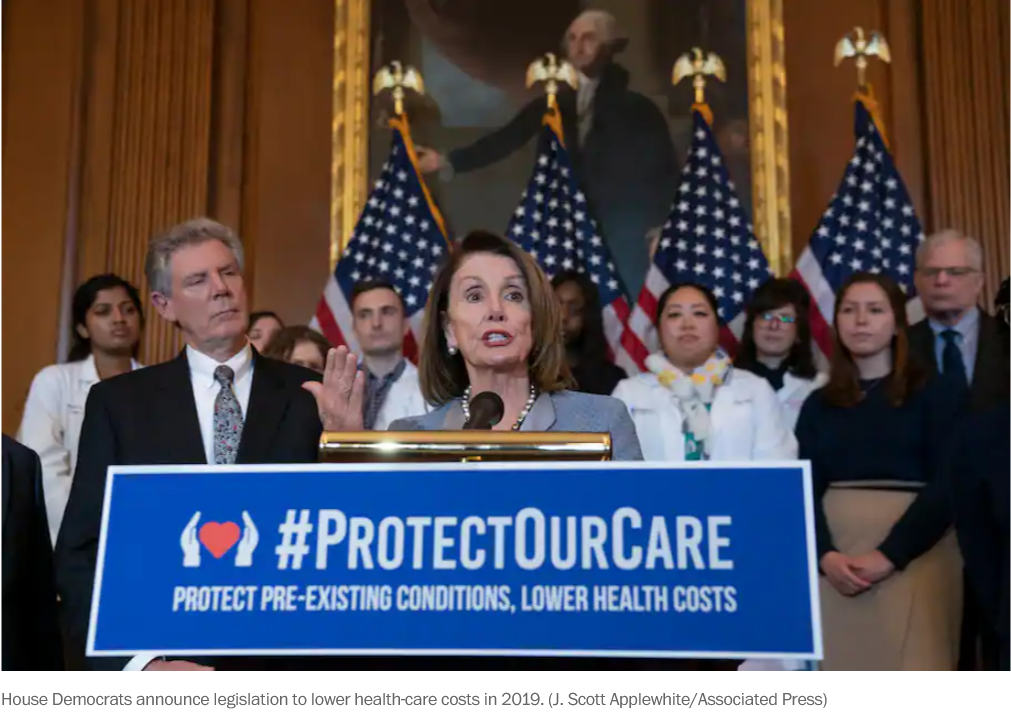By Paige Winfield Cunningham for the Washington Post
House Democrats say they’ll make an effort to include H.R. 3 — the measure allowing the federal government to directly negotiate lower drug prices — in whatever infrastructure and jobs bill congressional leaders are trying to hammer out over the summer.
House Energy and Commerce Chairman Frank Pallone Jr. (D-N.J.) told reporters yesterday that he’s aiming to get the measure attached to the package — a package that almost certainly represents Democrats’ best shot this year at turning their top priorities into law.
“This is a necessity,” Pallone said on a call hosted by the group Protect Our Care. “We definitely want to do it this year.”
H.R. 3’s only realistic hope lies in getting attached to the jobs and infrastructure package.
And it would only, possibly work if Democrats decide to bypass Republicans entirely by using the budget reconciliation process.
This week, President Biden is continuing negotiations with Republicans over the pending deal to improve the nation’s roads, bridges, pipes, ports and Internet connections — and it remains unclear how it all will unfold.
White House spokeswoman Jen Psaki laid out a number of possible paths toward passing infrastructure legislation on a bipartisan basis, although she has also said the clock is ticking on Democrats working with Republicans. The White House is leaving open the possibility of muscling the legislation through without the GOP.
If the effort at bipartisanship falters, all eyes will be on Sen. Joe Manchin III (D-W.Va). “Should Democrats and Republican fail to broker a deal, the White House will need every Democratic senator to rally behind the infrastructure bill on a party-line vote, making Manchin a pivotal figure capable of making or breaking a centerpiece of the Biden agenda,” our colleagues Mike DeBonis and Sean Sullivan write.
Manchin has sponsored legislation allowing the federal government to directly negotiate lower drug prices, so the thought is that he’d be fine with adding elements of H.R. 3 to a budget reconciliation bill, although he hasn’t explicitly said that. H.R. 3 also carries the benefit of being a net positive on federal spending, since the Congressional Budget Office has scored the direct negotiation piece as saving $456 billion over a decade.

Still, the future of H.R. 3 is far from certain.
President Biden and House Speaker Nancy Pelosi (D-Calif.) also say they want it passed, and two House committees held hearings on it in May.
But enough House moderates have expressed hesitation that it could easily be derailed. In a recent letter led by Rep. Scott Peters (D-Calif.), 10 Democratic members of Congress told Pelosi they want “bipartisan, bicameral support, with buy-in from a majority of Americans and stakeholders in the public and private sectors.”
Peters and seven of the signers voted for H.R. 3 when the House passed it in late 2019. But Peters told Politico he only voted for the bill to “start a conversation” about lowering prescription drug prices, with the understanding that it wouldn’t ultimately be passed by the Senate.
Democrats currently hold the House majority by just eight seats, but Pallone brushed off the letter when asked about it yesterday, saying he has “no doubt” the chamber could once again pass H.R. 3.
“If you look at that letter, it didn’t really say they wouldn’t support it,” Pallone said. “There may be parts of it they might like to see changed, but the basic idea of having the government negotiate prices is the key.”
Meanwhile, Trump’s foray into lowering drug prices is fading into the background.
The former president spent his four years in office promising the American people he’d significantly lower the cost of prescription drugs. His administration did advance several policies to do so, including issuing several regulations late last year.

But those regulations have largely been blocked or delayed, and the Biden administration has shown little interest in advancing them.
- In January, a federal court blocked Trump’s “most-favored-nations model,” which would have tested tying the prices of certain Medicare drugs to lower prices in other countries. The Biden administration would have to start over with the traditional rulemaking process, which the court said the Trump administration inappropriately skipped.
- The Biden administration has also delayed a Trump-era rule banning drug rebates for manufacturers in the Medicare program. Now the rule isn’t slated to take effect until Jan. 1, 2023.
- And in late May, the Biden administration indicated it has no timeline on whether it will allow states to import drugs from Canada. The Trump administration approved a rule allowing states to seek permission for drug importation, which the pharmaceutical industry is suing to block.

